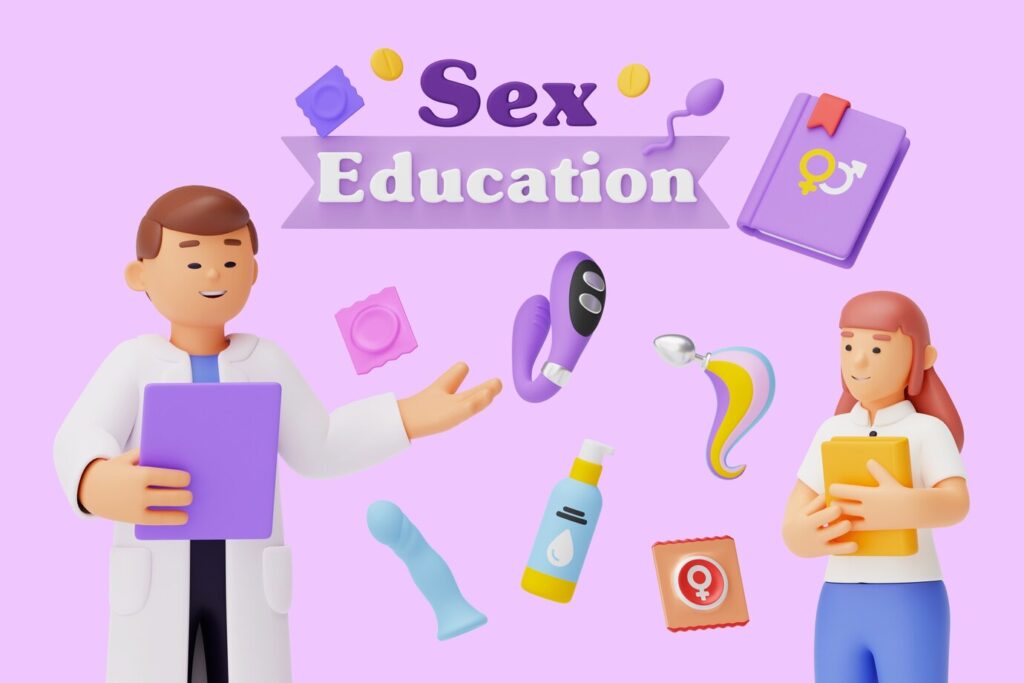Sex education plays a pivotal role in shaping the attitudes, behaviors, and well-being of individuals in society.
As a comprehensive and structured learning process, sex education goes beyond the biological aspects of reproduction, aiming to equip individuals with the knowledge and skills necessary to make informed decisions about their sexual health.
This article explores the multifaceted impact of sex education, encompassing its significance, challenges, and the far-reaching effects it can have on individuals and communities.

Table of Contents
ToggleThe Importance of Sex Education
Defining Sex Education
- Clarifying the scope and objectives of sex education.
- The evolution of sex education: from traditional to comprehensive approaches.
Early Education and Awareness
- The role of age-appropriate sex education in fostering a healthy understanding of human anatomy and development.
- Debunking common misconceptions surrounding sex education in early childhood.
Empowering Decision-Making
- How sex education empowers individuals to make informed decisions about their bodies and relationships.
- The link between comprehensive sex education and reduced rates of unplanned pregnancies and sexually transmitted infections (STIs).
Challenges in Sex Education
Controversies and Opposition
- Analyzing the challenges faced by sex education programs, including opposition from various groups.
- Strategies for addressing resistance and promoting acceptance.
Gaps in Curriculum and Implementation
- Identifying gaps and shortcomings in existing sex education curricula.
- The importance of standardized, inclusive, and culturally sensitive approaches.
Digital Age Challenges
- Navigating the impact of the digital age on sex education.
- Addressing the role of online information, social media, and pornography in shaping sexual attitudes.

The Impact of Sex Education on Mental and Emotional Well-being
Reducing Stigma and Shame
- Exploring how sex education contributes to breaking down societal taboos and reducing stigma around sexual health.
- The role of open communication in fostering a healthy, shame-free environment.
Building Healthy Relationships
- Examining the correlation between sex education and the development of respectful, consensual relationships.
- The impact on communication, consent, and emotional intimacy.
Mental Health and Sexuality
- Discussing the connection between mental health and sexual well-being.
- How sex education can contribute to positive mental health outcomes.
Inclusivity and Diversity in Sex Education
LGBTQ+ Inclusivity
- The importance of inclusive sex education that addresses the diverse experiences of LGBTQ+ individuals.
- Challenges and successes in implementing LGBTQ+-inclusive curricula.
Cultural Sensitivity
- Recognizing the significance of culturally sensitive sex education.
- Strategies for adapting sex education to diverse cultural contexts.

Addressing Real-world Issues
Teenage Pregnancy and Parenthood
- The impact of sex education on reducing rates of teenage pregnancy.
- Programs and initiatives that support young parents.
STI Prevention and Sexual Health Services
- The role of sex education in promoting STI prevention and access to sexual health services.
- Challenges in ensuring comprehensive sexual health care.
Toward a Comprehensive, Inclusive Future
Sex education is a powerful tool that extends beyond the classroom, influencing the well-being of individuals and societies at large. By addressing challenges, embracing inclusivity, and recognizing the broader impact on mental and emotional health, sex education can play a crucial role in fostering informed, healthy relationships. As we move forward, it is essential to prioritize and advocate for comprehensive, inclusive sex education that empowers individuals to navigate the complexities of human sexuality with confidence and respect.
Benefits of Sex Education and its Impact
Sex education provides numerous benefits and has a significant impact on individuals, communities, and societies. Here are some key advantages:
Informed Decision-Making
Understanding Body and Reproduction: Sex education equips individuals with knowledge about human anatomy, reproduction, and sexual health, enabling them to make informed decisions about their bodies and relationships.
Reducing Unplanned Pregnancies: Comprehensive sex education has been linked to lower rates of unplanned pregnancies, as individuals are more likely to use contraception and engage in responsible sexual behaviors.
Promoting Healthy Relationships
Communication Skills: Sex education emphasizes the importance of effective communication in relationships, fostering healthy dialogues about desires, boundaries, and consent.
Building Respectful Relationships: By addressing topics like consent, mutual respect, and emotional intimacy, sex education contributes to the development of respectful and consensual relationships.
Reducing Stigma and Shame
Breaking Taboos: Sex education helps break down societal taboos surrounding sexuality, reducing stigma and shame associated with discussions about sexual health.
Fostering Openness: Encouraging open communication in educational settings creates an environment where individuals feel comfortable discussing their concerns and seeking information.
Mental and Emotional Well-being
Positive Body Image: Sex education plays a role in promoting positive body image by fostering a realistic understanding of diverse body types and sexual experiences.
Emotional Well-being: Understanding the emotional aspects of sexuality contributes to overall mental health, helping individuals navigate their feelings and emotions.
STI Prevention and Sexual Health Services
Knowledge about STIs: Sex education provides information about sexually transmitted infections (STIs), promoting awareness, prevention, and early detection.
Access to Services: Educating individuals about sexual health services and resources enhances their ability to seek appropriate care and support.
Inclusivity and Diversity
LGBTQ+ Awareness: Inclusive sex education recognizes and validates the experiences of LGBTQ+ individuals, fostering understanding, empathy, and acceptance.
Cultural Sensitivity: Sex education that acknowledges diverse cultural perspectives ensures that the information is relevant and respectful to individuals from various cultural backgrounds.
Teenage Pregnancy Prevention
Delaying Sexual Debut: Sex education has been associated with delayed sexual debut among adolescents, contributing to lower rates of teenage pregnancies.
Parenting Education: Comprehensive sex education programs often include information about responsible parenting, supporting young parents in navigating their roles.
Empowerment and Autonomy
Empowering Choices: By providing accurate information and fostering critical thinking, sex education empowers individuals to make choices that align with their values and preferences.
Respecting Autonomy: Education about personal boundaries and consent reinforces the importance of respecting individual autonomy in intimate relationships.
Preventing Sexual Violence
Understanding Consent: Sex education plays a crucial role in teaching the concept of consent, contributing to a culture that opposes sexual violence and harassment.
Empathy and Respect: Education on healthy relationships and boundaries helps create a society that values empathy, respect, and the well-being of all individuals.
Long-Term Societal Benefits
Reducing Healthcare Costs: By promoting responsible sexual behaviors and preventing unplanned pregnancies and STIs, sex education can contribute to long-term reductions in healthcare costs.
Enhancing Social Well-being: Informed and sexually healthy individuals contribute to the overall well-being of communities, fostering healthier and more supportive societies.
Disadvantage of Sex Education and its Impact
While sex education has numerous advantages, it is important to acknowledge some potential disadvantages and challenges associated with its implementation. It’s crucial to note that these concerns often arise due to variations in cultural, religious, or individual perspectives. Here are some of the perceived disadvantages:

Controversial or Sensitive Topics
Discomfort and Opposition: Some individuals, families, or communities may find discussions on certain topics uncomfortable or against their cultural or religious beliefs, leading to opposition or resistance to sex education.
Age Appropriateness
Premature Exposure: Critics argue that introducing certain sexual topics at a young age may expose children to information prematurely, potentially impacting their innocence or causing confusion.
Varied Implementation Quality
Inconsistent Quality: The quality and content of sex education programs can vary widely between schools and regions, leading to inconsistencies in the information provided and potentially limiting the effectiveness of the education.
Parental Concerns
Infringement on Values: Some parents may feel that sex education encroaches on their role as primary educators on moral and sexual matters, leading to concerns about conflicting values.
Misinformation or Biased Content
Inaccurate Information: In some cases, sex education programs may contain outdated or biased information, potentially perpetuating stereotypes or promoting unrealistic expectations.
Fear of Promoting Early Sexual Activity
Concerns About Promiscuity: Critics argue that comprehensive sex education may inadvertently promote early sexual activity by providing information on contraception and safe sex practices.
Lack of Comprehensive Coverage
Neglect of Emotional Aspects: Some sex education programs may focus more on the biological and physical aspects of sex, neglecting emotional and relationship components, leading to an incomplete understanding.
Cultural Sensitivity Issues
Ignoring Cultural Diversity: Sex education materials and approaches may not always be culturally sensitive, potentially marginalizing or alienating individuals from diverse cultural backgrounds.
Stigmatization of Certain Identities
Stigmatizing LGBTQ+ Individuals: In some cases, sex education may fail to address the needs and experiences of LGBTQ+ individuals, contributing to stigma and discrimination.
Limited Impact on Behavior
Challenge of Behavior Change: Critics argue that despite receiving sex education, individuals may not necessarily change their behaviors, and societal issues such as unplanned pregnancies and STIs may persist.
Resource Allocation
Budget Constraints: In resource-strained educational systems, the allocation of funds and time to sex education programs may be insufficient, limiting the effectiveness of implementation.
Teacher Preparedness
Lack of Training: Some teachers may not feel adequately trained or comfortable discussing certain aspects of sex education, potentially impacting the quality of instruction.

Advantage of Sex Education and its Impact
Sex education offers numerous advantages and positive impacts on individuals, communities, and societies. Here are key benefits associated with comprehensive sex education:
Informed Decision-Making
Knowledge Empowerment: Sex education provides individuals with accurate information about reproductive health, contraception, and sexual anatomy, empowering them to make informed decisions about their bodies and relationships.
Promoting Healthy Relationships
Communication Skills: Sex education emphasizes the importance of open and honest communication in relationships, fostering positive interactions and understanding between partners.
Consent Education: It educates individuals about the concept of consent, ensuring that relationships are built on mutual agreement and respect for personal boundaries.
Reducing Unplanned Pregnancies and STIs
Contraception Awareness: Comprehensive sex education has been linked to lower rates of unplanned pregnancies as individuals are educated about various contraception methods.
STI Prevention: Education on safe sex practices and STI prevention measures contributes to reducing the spread of sexually transmitted infections.
Emphasizing Inclusivity and Diversity
LGBTQ+ Inclusivity: Sex education programs that are inclusive of diverse sexual orientations and gender identities help create an environment that respects and acknowledges the experiences of LGBTQ+ individuals.
Cultural Sensitivity: Inclusive sex education materials and approaches consider diverse cultural perspectives, fostering understanding and respect for cultural differences.
Fostering Emotional and Mental Well-being
Body Positivity: Sex education addresses body image issues and promotes body positivity, contributing to improved mental and emotional well-being.
Emotional Health: It provides information about the emotional aspects of relationships, helping individuals navigate their feelings and experiences.
Preventing Sexual Violence
Consent Education: Sex education teaches the importance of consent, contributing to the prevention of sexual violence by fostering a culture of respect and communication in intimate relationships.
Empowering Individuals
Critical Thinking Skills: Sex education encourages critical thinking, enabling individuals to evaluate information, make responsible choices, and navigate societal norms.
Empowerment Through Knowledge: By arming individuals with comprehensive knowledge, sex education empowers them to take control of their sexual health and well-being.
Teenage Pregnancy Prevention
Delaying Sexual Debut: Sex education has been associated with delayed sexual debut among adolescents, contributing to a reduction in teenage pregnancies.
Parenting Education: Comprehensive sex education often includes information on responsible parenting, supporting young parents in navigating their roles.
Healthcare Cost Reduction
Reduced Healthcare Expenses: By preventing unplanned pregnancies and reducing the prevalence of STIs, sex education contributes to long-term reductions in healthcare costs associated with reproductive and sexual health.
Community and Societal Benefits
Healthier Communities: A sexually educated population contributes to healthier and more supportive communities, fostering empathy, understanding, and inclusivity.
Reduced Social Stigma: Sex education helps break down societal taboos surrounding sexuality, reducing stigma and promoting open communication about sexual health.
Digital Literacy and Media Awareness
Navigating Online Information: Sex education addresses the influence of digital media and pornography, promoting digital literacy and critical thinking skills to help individuals navigate online information responsibly.
Improved Teacher-Student Relationships
Establishing Trust: Teachers providing sex education create an environment of trust and support, facilitating open communication between students and educators.
Preventing Gender-Based Violence
Understanding Gender Dynamics: Sex education addresses gender roles and dynamics, contributing to the prevention of gender-based violence by fostering equality and respect.
Preventing Bullying and Harassment
Creating Inclusive Environments: Inclusive sex education can help prevent bullying and harassment by promoting understanding and acceptance of diverse sexual orientations and gender identities.
Frequently Asked Questions (FAQ)

Q1: What is sex education, and why is it important?
A1: Sex education is a structured learning process that provides individuals with information about human sexuality, relationships, and reproductive health. It is important because it empowers individuals to make informed decisions, promotes healthy relationships, and contributes to overall sexual well-being.
Q2: At what age should sex education begin, and what topics should be covered in early education?
A2: Sex education should begin in age-appropriate stages. Early education focuses on basic anatomy, personal boundaries, and understanding differences. As children mature, topics expand to include puberty, reproduction, and the importance of respect in relationships.
Q3: How does sex education address issues of consent and communication in relationships?
A3: Sex education emphasizes the importance of clear communication and mutual consent in relationships. It provides guidance on understanding and respecting personal boundaries, fostering open dialogues about desires, and promoting consensual interactions.
Q4: What challenges does sex education face, and how can they be addressed?
A4: Challenges include opposition from certain groups, gaps in curriculum, and the influence of digital media. Addressing these challenges requires community involvement, advocating for inclusive curricula, and adapting education to incorporate digital literacy and critical thinking skills.
Q5: Does sex education contribute to reducing rates of teenage pregnancy?
A5: Yes, comprehensive sex education has been linked to lower rates of teenage pregnancy. By providing information about contraception, reproductive health, and responsible sexual behavior, sex education empowers young people to make informed choices, reducing the risk of unplanned pregnancies.
Q6: How does sex education address LGBTQ+ inclusivity?
A6: Inclusive sex education recognizes and respects the experiences of LGBTQ+ individuals. It covers diverse sexual orientations, gender identities, and relationships, fostering understanding, acceptance, and support.
Q7: Can sex education help prevent sexually transmitted infections (STIs)?
A7: Yes, sex education plays a crucial role in STI prevention. It provides information about safe sexual practices, encourages regular testing, and promotes awareness of the importance of seeking timely medical care for prevention and treatment.
Q8: What role does sex education play in promoting mental and emotional well-being?
A8: Sex education contributes to positive mental and emotional well-being by addressing body image issues, promoting self-acceptance, and fostering healthy relationships. It encourages open communication about emotions, reducing stigma and shame associated with sexuality.
Q9: How can sex education empower individuals to make informed decisions about their sexual health?
A9: Sex education empowers individuals by providing accurate information about anatomy, contraception, and sexual health. It teaches critical thinking skills, encouraging individuals to make decisions aligned with their values and preferences.
Q10: What long-term societal benefits are associated with comprehensive sex education?
A10: Long-term benefits include lower healthcare costs due to reduced rates of unplanned pregnancies and STIs. Additionally, a sexually educated population contributes to the creation of healthier, more supportive communities that prioritize empathy, respect, and overall well-being.
Q11: How can parents and caregivers complement school-based sex education?
A11: Parents and caregivers can support sex education by fostering open communication at home, addressing questions with accurate information, and reinforcing values related to respect, consent, and healthy relationships.
Q12: How can individuals advocate for comprehensive sex education in their communities?
A12: Individuals can advocate for comprehensive sex education by engaging with school boards, supporting evidence-based programs, and participating in community discussions. Educating others about the importance of inclusive, age-appropriate sex education is key to promoting positive change.
Q13: Does sex education address the impact of digital media and pornography on sexual attitudes?
A13: Yes, modern sex education often includes discussions about the influence of digital media and pornography. It aims to develop critical thinking skills, helping individuals navigate online information responsibly and fostering a realistic understanding of sexuality.
Q14: How does sex education contribute to a culture that opposes sexual violence?
A14: Sex education addresses the concept of consent, teaching individuals to recognize and respect personal boundaries. By fostering an understanding of healthy relationships and communication, it contributes to a culture that opposes sexual violence and harassment.
Q15: How can sex education adapt to be culturally sensitive and inclusive?
A15: Culturally sensitive sex education involves acknowledging and respecting diverse cultural perspectives. This includes incorporating diverse examples, understanding cultural norms, and involving the community in shaping the curriculum to ensure relevance and inclusivity.
These FAQs provide an overview of common questions related to sex education and its impact, addressing the importance, challenges, and positive outcomes associated with comprehensive sexual education programs.
